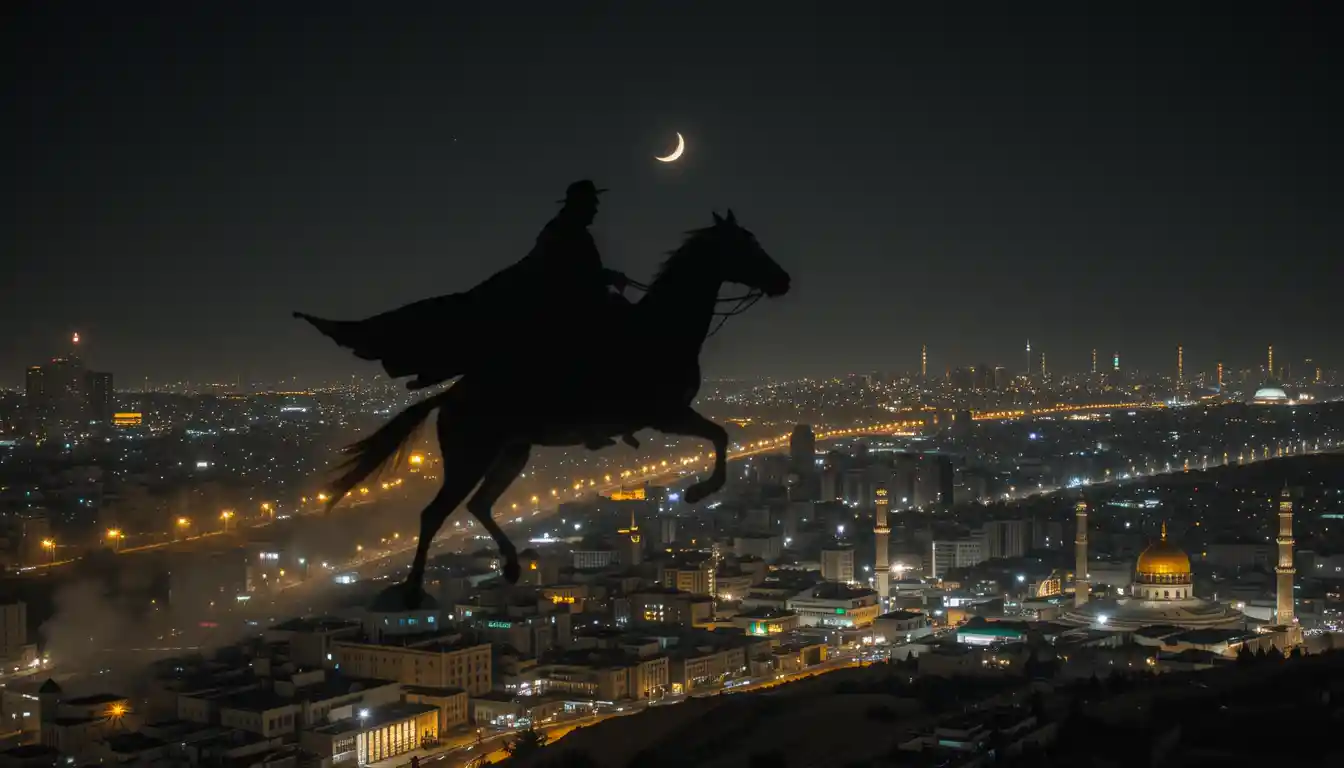In the annals of Islamic history and tradition, there are stories that serve not merely as tales of the past, but as profound, timeless warnings. They are mirrors held up to humanity, reflecting the consequences of pride, ingratitude, and the folly of challenging the dominion of Allah. One such powerful narrative is the story of Shaddad ibn ‘Ad, the arrogant king who dared to build his own paradise on Earth.While the full, detailed narrative of Shaddad is found in classical Islamic literature and commentaries like those of Ibn Kathir, the Qur’an itself alludes to the magnificent and defiant civilization he belonged to. Allah SWT asks pointedly in Surah Al-Fajr:
أَلَمْ تَرَ كَيْفَ فَعَلَ رَبُّكَ بِعَادٍ. إِرَمَ ذَاتِ الْعِمَادِ. الَّتِي لَمْ يُخْلَقْ مِثْلُهَا فِي الْبِلَادِ
Have you not considered how your Lord dealt with ‘Aad – [with] Iram of the pillars, The like of which was not created in the lands?” (Qur’an 89:6-8)
This city, “Iram of the Pillars,” is the very paradise Shaddad built. Let us delve into his story to understand the lessons woven within.
A Miraculous Beginning in the Hands of Allah
Our story begins not with a king, but with a helpless infant. A newborn Shaddad, only two or three days old, was with his mother on a ship crossing the vast ocean. Suddenly, a violent storm descended, and the ship began to sink into the abyss. In the chaos, Shaddad’s mother spotted a piece of floating wreckage. Clinging to it with her last ounce of strength, she held her baby close, a lone survivor in a watery grave.As they floated aimlessly, with nothing but the sky above and the endless sea below, her heart ached for her child. How could he survive? At that moment, Allah SWT commanded the Angel of Death, Azrael (alayhis salam), to descend and take the soul of the mother. The angel, witnessing her final moments of caressing and trying to nurse her infant, felt a pang of pity. He thought to himself, “O Allah, I am to take this mother’s soul, but what will become of this tiny, helpless child?” With a heavy heart, he fulfilled the command.The storm subsided, and by the will of Allah, the wooden plank carrying the infant Shaddad drifted to the shore of a wild jungle. The baby, hungry and alone, began to cry. In that same jungle, a tigress had just lost her cubs. Hearing the infant’s cries, Allah placed mercy in the predator’s heart. The tigress approached the child, not as prey, but with a strange tenderness, and began to nurse him with her own milk.This was the first lesson: Shaddad’s very existence was a miracle, a testament to Allah as Ar-Rabb (The Lord and Sustainer), who can provide for His creation from means we can neither predict nor comprehend.
The Rise to Unparalleled Power
A day later, a fisherman passing by the jungle’s edge was startled by the sight of a beautiful human baby. Astonished, he wondered, “O Allah, what a beautiful child! How did he survive here, with no one to care for him?” His heart filled with compassion, he took the child to his tribe’s chieftain. The chieftain, who was childless, was immediately captivated by the boy and decided to adopt him, naming him Shaddad.Shaddad grew into a remarkably handsome, strong, and intelligent young man. One day, while playing, he encountered a group of soldiers. One of them, who was blind, was searching for surma (antimony/kohl), which he believed could cure his blindness. He found a beautiful container and was about to apply its contents when a fellow soldier warned him to test it first. They called over the fearless young Shaddad and instructed him to apply the surma.The moment the surma touched Shaddad’s eyes, a miracle occurred. His physical sight remained, but his inner sight was opened. He could suddenly see all the hidden treasures beneath the earth—the veins of gold, silver, diamonds, and precious gems. A cunning and deceitful thought entered his heart. He pretended the surma had caused him immense pain, crying out that his eyes were burning. The soldiers, believing the kohl to be cursed, threw the container away and fled. Shaddad immediately retrieved it.This was the turning point. Using this newfound ability, Shaddad guided his adoptive father and his men to unimaginable wealth. Over the next decade, they amassed treasures beyond counting. When the old chieftain died, the people unanimously chose the wealthy and powerful Shaddad as their new leader.His ambition, however, knew no bounds. He raised a formidable army and overthrew the king of the land, seizing the throne for himself. The once-helpless infant, saved by the mercy of Allah, was now the most powerful man in the kingdom.
The Confrontation with Truth and the Height of Arrogance
With absolute power and wealth came a disease of the heart: kibr (arrogance). Shaddad became so proud that he began to see himself as divine. He convened his court and asked his ministers, “With my beauty, my wealth, and my power, am I not worthy of being a god?”His sycophantic ministers, fearing his wrath, replied in unison, “Indeed! If you are not a god, then who is? You possess everything!”This sealed his fate. He declared himself the one true god and commanded all his subjects to abandon their worship and prostrate to him instead.It was at this time that Allah sent the Prophet Hud (alayhis salam) to guide the people of ‘Ad back to Tawhid—the worship of the one true God. Prophet Hud (AS) bravely entered Shaddad’s court and challenged him directly: “O Shaddad, who gave you the audacity to claim divinity? Fear Allah and return to His path. He is the one who grants paradise in the Hereafter.”Shaddad laughed mockingly. “Paradise? What is this paradise of your God? Tell me about it.”Prophet Hud (AS) described the glories of Jannah—its rivers of milk and honey, its unimaginable beauty, and its eternal bliss. Shaddad’s response was the pinnacle of blasphemy.”Stop this nonsense!” he bellowed. “Why should I bow to your God? I can build a paradise just like His, right here on this earth! I lack nothing.”Prophet Hud (AS) was aghast. “You have lost your mind, Shaddad! No mortal can replicate what Allah has created.”But Shaddad, blinded by his pride, expelled the Prophet and immediately set his plan in motion.
The Paradise of Iram
A Monument to Defiance Shaddad launched the most ambitious construction project in human history. He chose a vast expanse of land and commanded that all gold, silver, and jewels in the kingdom be confiscated for his project. For 300 years, hundreds of thousands of the world’s most skilled artisans worked relentlessly.The palace walls were built with alternating bricks of solid gold and silver.The ground was paved with precious stones, and rivers of rosewater and milk flowed through man-made channels.Trees were fashioned from gold, with leaves of emerald and fruits of rubies and pearls.The air was filled with the fragrance of musk and amber.Beautiful pavilions were erected, filled with the most beautiful men and women to serve his every desire.After three centuries, the magnificent “Paradise of Iram” was complete. It was a spectacle of opulence so dazzling that it defied imagination. Shaddad, dressed in his finest robes and accompanied by his entire entourage, set off to inaugurate his creation and declare himself the god of his own heaven.
The Final, Crushing Judgment
As Shaddad and his procession approached the gates of his paradise, his heart swelled with pride. He saw its glittering towers from a distance and thought, “This is my heaven. Here, I will reign as a god forever.”He rode ahead to the main gate. As he prepared to dismount and step into his paradise, he saw a figure of stunning beauty standing at the entrance. “Are you the guardian of this paradise?” Shaddad asked, pleased.The figure replied, “No. I am Malak-ul-Mawt, the Angel of Death.”Shaddad froze. “The Angel of Death? What do you want here?””I have come for your soul, by the command of Allah,” Azrael (AS) replied calmly.Panic and rage seized Shaddad. He tried to fight, but his body was paralyzed. He looked back at his massive army, only to see that they had all vanished, struck down by the will of Allah. He was utterly alone. Trembling, he begged, “O Angel of Death, grant me just one moment! I have spent centuries building this paradise. Let me just set one foot inside. Let me see it just once!”The angel’s voice was like thunder: “You will not take a single step further.”And in that very moment, as Shaddad had one foot in the stirrup and the other reaching for the ground, his soul was seized from his body. Before he could even touch the ground of his own creation, he fell down, lifeless. At that instant, a mighty blast from the heavens, a terrible cry (sayhah), descended upon the Paradise of Iram, and the entire city, with all its opulence, was utterly destroyed, swallowed by the earth as if it had never been.
The Angel’s Reflection and the Ultimate Lesson
Years later, the Angel of Death, Azrael (AS), was in the presence of Allah SWT. He said, “O Allah, in my duty of taking souls, I have never felt pity, except for two occasions. The first was for the mother on the sinking ship, as I wondered what would become of her helpless infant. The second was for the king Shaddad. After he spent 300 years building his paradise, my heart felt a pang of sorrow that he could not even look upon it for a single moment before he died.”Allah, the All-Knowing, replied:
“O Azrael, do you not know? The arrogant king for whom you felt pity was the very same helpless infant for whose mother you felt pity. I saved him from the sea, I sustained him with the milk of a tigress, I gave him a loving home, and I blessed him with wealth and power beyond measure. But when he was blessed, he became arrogant. He forgot his humble beginnings, denied his Lord, and transgressed all bounds. I did not give him a chance to enter his paradise because My mercy is for the humble, not for the proud who challenge My authority.”
This story is a stark reminder for us all. We live our lives surrounded by the blessings of Allah—health, family, wealth, and intellect. How often do we, like Shaddad, forget the Source of these blessings and allow pride to creep into our hearts?Let us take heed. All power, all wealth, and all life are transient gifts from Allah. True success lies not in building palaces on earth, but in building a foundation of faith, humility, and gratitude that will earn us a place in the eternal Paradise of our Lord.
May Allah SWT protect us from the disease of arrogance and keep us among His grateful servants. Amin.


